Southwest Airlines has agreed to purchase over 400,000 carbon credits from SMBC Aviation Capital, the world’s second largest aircraft leasing company, to support the airline’s employee business and charitable travel, or to meet CORSIA requirements. As the first aircraft lessor to develop a carbon credit programme, SMBC Aviation Capital announced in September 2022 an initial investment of $53.3 million in projects that align with up to 10 of the 17 UN Sustainable Development Goals (SDGs), including good health and well-being, gender equality and climate action. Part of the investment will also support local community initiatives such as irrigation schemes and micro finance opportunities for women. Carbon credits can be obtained from the Ireland-based lessor by airlines either as part of an aircraft lease contract or independently. It has placed 12 Boeing 737-8 MAX aircraft with Southwest and is also collaborating with partners on scaling up sustainable aviation fuel production.
“Southwest continues to make sustainability a priority and we are delighted to partner with them as the first customer of our newly-established carbon credit programme,” commented David Swan, Chief Operations & Sustainability Officer at SMBC Aviation Capital. “This announcement supports our objective of working with our airline customers to accelerate their path to environmental sustainability. We believe that by taking tangible actions and working together we can make a positive change, especially in a hard-to-abate sector like aviation.”
Through Belgium-based CO2 Logic, SMBC Aviation Capital has invested in a project in Burkina Faso, West Africa, that will provide energy-efficient cookstoves to 28,000 families who have previously relied on traditional cooking methods that are harmful to health and the environment. According to the Clean Cooking Alliance, the use of open fires and solid fuels for cooking causes nearly 4 million premature deaths each year and, according to the US Environmental Protection Agency, the average open fire produces nearly as much CO2 as the average motor vehicle.
Separately, the lessor is working with US carbon project developer C-Quest Capital to forward purchase carbon credits from a range of cookstove projects across Africa, Asia and Central America, which aim to reach over 3.2 million households and meet a minimum of seven SDGs.
Due diligence across all projects has been independently undertaken by Climate Focus, which is based in the Netherlands.
Under the agreement with Southwest, the airline will be acquiring over a five-year timeframe carbon credits certified by either Gold Standard or Verra from SMBC Aviation Capital’s funded projects in Africa and Central America.
“We recognise the important roles that both in-sector and out-of-sector levers play in our sustainability journey,” said Chris Monroe, SVP Finance Treasury & Sustainability, Southwest Airlines. “Expanding our existing partnership with SMBC Aviation Capital supports these projects that are expected to help mitigate carbon while contributing positively to local communities.”
In October 2021, Southwest laid out a 10-year plan to maintain carbon neutrality to 2019 levels, which included the first US-based carbon offset initiative that offered customers loyalty points, and for every dollar contributed towards offsetting Southwest’s carbon emissions, the airline would match the contribution.
The plan also incorporated a target to reduce carbon emissions per available seat mile (including scope 1 and scope 2 emissions) by at least 20% by 2030 through fleet modernisation, route optimisation and other initiatives. The airline also plans to replace 10% of its total jet fuel consumption with sustainable aviation fuel by 2030.
Towards the end of 2021, Southwest signed a 15-year offtake agreement with Velocys Renewables for 219 million gallons of SAF, with deliveries commencing as early as 2026 from the Velocys Bayou Fuels facility in Natchez, Mississippi. The airline estimates the fuel could avoid 6.5 million tonnes of CO2 over the term of the agreement.
In June last year, Southwest announced an investment in SAFFiRE Renewables, a company formed by D3MAX, which in 2021 was awarded a grant by the US Department of Energy towards a pilot-scale facility. The grant is being matched by Southwest and the SAFFiRE project is expected to utilise technology developed by the DOE’s National Renewable Energy Laboratory to convert corn stover, a widely available waste feedstock in the US, into renewable ethanol that then would be upgraded into SAF. The investment and grant supports phase one of the project, which is expected to include technology validation, preliminary design and a business plan for a pilot plant.
“This is a unique opportunity to invest in what we believe could be game-changing technology that could facilitate the replacement of up to approximately 5% of our jet fuel with SAF by2030, with the potential to significantly continue to scale beyond the decade,” commented Southwest CEO Bob Jordan at the time of the announcement. “This first-of-its-kind investment is another step we are taking to address our environmental impact and it also supports our efforts to partner with organisations and government entities to help our industry reach the goal of carbon neutrality by 2050.”
SMBC Aviation Capital has an owned, managed and committed fleet of over 900 aircraft and is working to a target of up to 80% of new technology aircraft in its fleet by the end of 2025. It is working with shareholder Sumitomo Corporation to explore ways to increase the supply of SAF and is also collaborating with Aircraft Leasing Ireland on starting production of SAF in Ireland. It has developed its own framework to achieve net zero in its own operations by 2050 and has offset all of its operational emissions since 2019. Scope 3 emissions are determined by Fexco Group company PACE.
Image (Boeing): Southwest Airlines Boeing 737 MAX


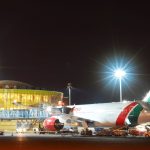
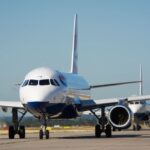
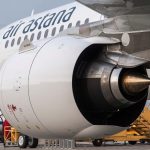

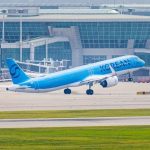



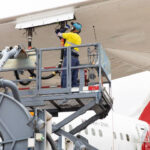




More News & Features
African Development Bank and Japanese industrialist unite to explore SAF production in Africa
LanzaJet and KMG agree to progress SAF production project in Kazakhstan
SkyNRG says e-SAF and carbon removals should not be competing strategies for aviation decarbonisation
South Korea announces mandatory SAF blending for departing international flights from 2027
Catagen launches SAF production company and signs offtakes with Ryanair and Shell
US rebukes ICAO for wasting resources on climate financing initiatives and warns against global levies